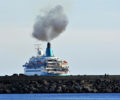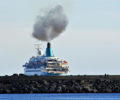

As a sector at the “forefront of the climate change challenge”, the maritime sector is stepping up to its climate change mitigation and resilience building responsibilities, according to UNCTAD.
But while the UN’s trade body commends and supports the International Maritime Organization (IMO) framework for its “clear goals, milestones and regulations” on reducing greenhouse gas emissions in shipping, it has also warned of the negative impacts of the IMO measures on some developing countries. It advises that some countries will likely require support to mitigate the increased maritime logistics costs and “alleviate the consequent negative impact on their respective real income and trade flows”.
Countries most affected by climate change are likely to be those potentially most negatively affected by the higher transport costs and lower maritime connectivity that may result from increased maritime logistics costs. These include small island developing states (SIDS) and least developed countries (LDCs).
UNCTAD has found that SIDS pay, on average, twice as much for the transport of their foreign trade than the world average due to their remoteness and lower maritime transport connectivity.
“Achieving the targets of the Initial IMO Strategy on reduction of GHG emissions from ships is crucial for sustainable development in an increasingly fragile, inter-linked, and complex global eco-system. Yet, navigating through the energy transition away from fossil-fuel-dependent combustion systems is still a significant challenge for the maritime transport industry,” says the UNCTAD Assessment of the Impact of the IMO Short-Term GHG Reduction Measure on States report. The report provides UNCTAD’s assessment of the potential impacts of short-term measures agreed by members of the IMO, which require ships to reduce their greenhouse gas emissions. The measures, expected to enter into force on November 1, 2022, are part of IMO’s strategy to reduce carbon intensity in international shipping by 40% by 2030, compared with 2008.
Not only will costs be greater, but there could be a shift in logistics and trade patterns as a result of the IMO’s short-term measures
Support needed
“SIDS and LDCs in particular will require technical and financial support to mitigate the costs of adjusting to low-carbon shipping,” said Shamika N Sirimanne, director of UNCTAD’s technology and logistics division, which prepared the report. “These vulnerable countries already face relatively higher transport and logistics costs, with most of their trade depending almost exclusively on maritime transport to access regional and global markets,” Sirimanne added.
Not only will costs be greater, but there could be a shift in logistics and trade patterns as a result of the IMO’s short-term measures – and that shift will, on average, be relatively higher for SIDS compared with advanced economies. This could see a move to trading more with closer markets and regionalisation.
As part of its modelling to assess the impact of the IMO short-term measures on States, UNCTAD converted changes in ship costs and speed, as estimated by DNV, into changes in maritime logistics costs to shippers and cargo interests. It then assessed how the computed changes in maritime logistics costs would impact trade flows and GDP. The impact on supply chain costs, ship journeys, and routing patterns were also examined across country-trade sector as well as ship types and routes, respectively.
This analysis found that small-sized vessels plying short-sea shipping routes will be more negatively affected compared with larger ships travelling longer distances. This could lead to “some substitution between ship sizes”, for example when a deepsea liner is required to go slower, potentially skipping a port and leading to more transhipment, adding to the use of smaller ships, and thereby leading to increased costs.
“To sum up, the IMO short-term measure does not only translate into potential changes in ship costs, but also changes in ship travel distance, fleet distribution, routing patterns, as well as market and regional connectivity levels,” said UNCTAD.
Greatest impact
In the analysis, the impact of sailing speed reduction and the potential for service reconfiguration is more obvious in the case of the Pacific and Caribbean SIDS where short-sea shipping and the use of general cargo ships are more prevalent: “Network analysis of regional shipping services within the Pacific and the Caribbean SIDS confirms that smaller economies in these two regions are heavily challenged by shipping (dis)connectivity and service (in)frequency; and could therefore be expected to be more adversely impacted by the IMO short-term measure.”
But despite the challenges, UNCTAD believes they are surmountable and that the demands to decarbonise shipping can be achieved. The report calls on policymakers to continue to aim high when it comes to addressing greenhouse gas emissions from shipping, but to also stand ready to assist weaker economies in adjusting to the transition.
The full report can be found here: https://unctad.org/system/files/official-document/dtltlb2021d2_en.pdf
Source: The Baltic Briefing